-
ORIGINAL ARTICLE10-09-2023
Construction and validation of a scenario for recognizing sepsis by nursing students: a methodological study
Revista Brasileira de Enfermagem. 2023;76(4):e20220537
Abstract
ORIGINAL ARTICLEConstruction and validation of a scenario for recognizing sepsis by nursing students: a methodological study
Revista Brasileira de Enfermagem. 2023;76(4):e20220537
DOI 10.1590/0034-7167-2022-0537
Views0See moreABSTRACT
Objective:
To build and validate a clinical simulation scenario for teaching Nursing students about early recognition of signs and symptoms of sepsis in the context of the emergency unit.
Methods:
Methodological study developed in two phases: construction of a simulated scenario and content validation by expert judges. For data analysis, the Content Validity Index (CVI) was calculated considering agreement equal to or greater than 80%. The minimum acceptable CVI value for scenario validation was 1.0.
Results:
The simulation scenario proved to be appropriate, with a global Content Validity Index equal to 1. Some adjustments related to the clarity of the wording were necessary, as suggested by the judges. Conclusions: A medium-complexity, high-fidelity scenario was successfully constructed and validated for teaching early recognition of sepsis signs and symptoms.
-
EXPERIENCE REPORT10-09-2023
Service organization protocol for coping with undergraduate students’ psychological distress: a collective construction
Revista Brasileira de Enfermagem. 2023;76(4):e20220535
Abstract
EXPERIENCE REPORTService organization protocol for coping with undergraduate students’ psychological distress: a collective construction
Revista Brasileira de Enfermagem. 2023;76(4):e20220535
DOI 10.1590/0034-7167-2022-0535
Views0See moreABSTRACT
Objective:
to report on the experience of the elaboration process of a service organization protocol for coping with public undergraduate students’ psychological distress in the countryside of São Paulo.
Method:
experience report on protocol production, an action research product, carried out according to the health care and service organization protocol model, made possible by remote meetings with 33 professionals linked to the management and services of the university’s health and social assistance departments.
Results:
collective protocol production provided an opportunity for an institutional agreement on educational, therapeutic and support actions, to be developed in groups or individually with students, with provision for permanent education with civil servants.
Final considerations:
this experience made it possible to list specific actions to face undergraduate students’ psychological distress, bringing health professionals closer to those in management, promoting the exchange of concepts and practices to re-signify and transform the work developed.
-
ORIGINAL ARTICLE10-09-2023
Performance of Family Health Strategy Nurses in LGBT+ Healthcare
Revista Brasileira de Enfermagem. 2023;76(4):e20220514
Abstract
ORIGINAL ARTICLEPerformance of Family Health Strategy Nurses in LGBT+ Healthcare
Revista Brasileira de Enfermagem. 2023;76(4):e20220514
DOI 10.1590/0034-7167-2022-0514
Views0See moreABSTRACT
Objective:
To analyze the role of Family Health Strategy (FHS) nurses in the health care of LGBT+ individuals.
Methods:
This qualitative study is based on Institutional Analysis. Data was collected in August 2021 through semi-structured interviews with 14 Family Health Strategy nurses from municipalities in the state of São Paulo. The data was processed using the IRaMuTeQ® software and analyzed lexically.
Results:
The textual corpus gave rise to three themes, which addressed the nurses’ practice, the difficulties and challenges they face in providing care to LGBT+ individuals, and the direct association of LGBT+ individuals with sexually transmitted infections.
Conclusion:
Lack of preparedness, access to information, and the need for expanded listening skills are still gaps in the performance of FHS nurses in caring for LGBT+ individuals. However, fostering acceptance and building strong relationships have been effective strategies in bridging the gap in nursing care for the LGBT+ community.
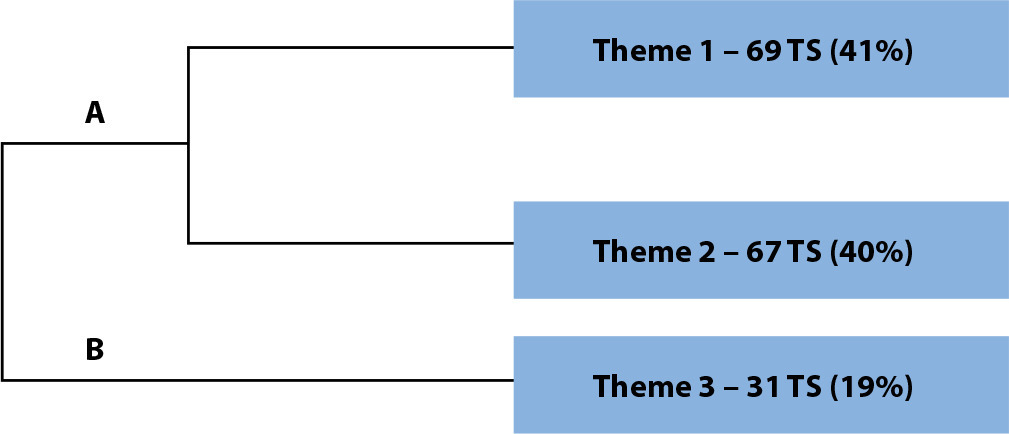
-
ORIGINAL ARTICLE10-09-2023
Perceived stress by mototaxi drivers and its relationship with sociodemographic and occupational characteristics
Revista Brasileira de Enfermagem. 2023;76(4):e20220505
Abstract
ORIGINAL ARTICLEPerceived stress by mototaxi drivers and its relationship with sociodemographic and occupational characteristics
Revista Brasileira de Enfermagem. 2023;76(4):e20220505
DOI 10.1590/0034-7167-2022-0505
Views0See moreABSTRACT
Objective:
To investigate the association of sociodemographic and occupational characteristics with a high level of perceived stress in motorcycle taxi drivers.
Method:
Cross-sectional study carried out with motorcycle taxi drivers who answered instruments on sociodemographic and occupational variables – Perceived Stress Scale, Job Content Questionnaire and Effort-Reward Imbalance. Descriptive statistics, Pearson’s chi-square test and Poisson regression with robust variance were used. Statistical significance was 5%.
Results:
Of the 800 motorcycle taxi drivers, 46.8% had a high level of perceived stress. In the multivariate analysis, a high level of stress was associated with low control over work (PR=7.76; 95%CI=5.19-11.61), low social support at work (PR=3.87; 95%CI =2.95 5.08), working hours longer than eight hours a day (RP=1.47; 95%CI=1.21-1.78) and monthly income less than or equal to two minimum wages (PR=1.34;95%CI=1.13-2.58).
Conclusion:
Long working hours, occupational stressors and low income were associated with a high level of perceived stress. Public policies and interventions to minimize occupational stressors are essential.
-
ORIGINAL ARTICLE10-09-2023
Educational intervention in social skills for Primary Care nurses
Revista Brasileira de Enfermagem. 2023;76(4):e20220503
Abstract
ORIGINAL ARTICLEEducational intervention in social skills for Primary Care nurses
Revista Brasileira de Enfermagem. 2023;76(4):e20220503
DOI 10.1590/0034-7167-2022-0503
Views0See moreABSTRACT
Objective:
to assess an educational intervention on social skills for nurses who work in Primary Health Care.
Method:
a qualitative research-intervention study, carried out in the municipalities covered by the 17th Health Regional of Paraná. It was developed in three interrelated stages: exploratory, where meetings were held with the managers to define the groups and logistics for running the course; intermediate, developed in meetings with different groups of nurses, addressing selected topics; assessment, in which the nurses developed a personal plan to improve their social skills.
Results:
participants were 57 nurses who acted as coordinators of Primary Care. They considered the educational intervention in social skills fundamental for positive changes in their professional performance.
Final considerations:
the educational intervention in social skills was assessed as an important strategy to strengthen the development of nurses’ managerial and care skills.
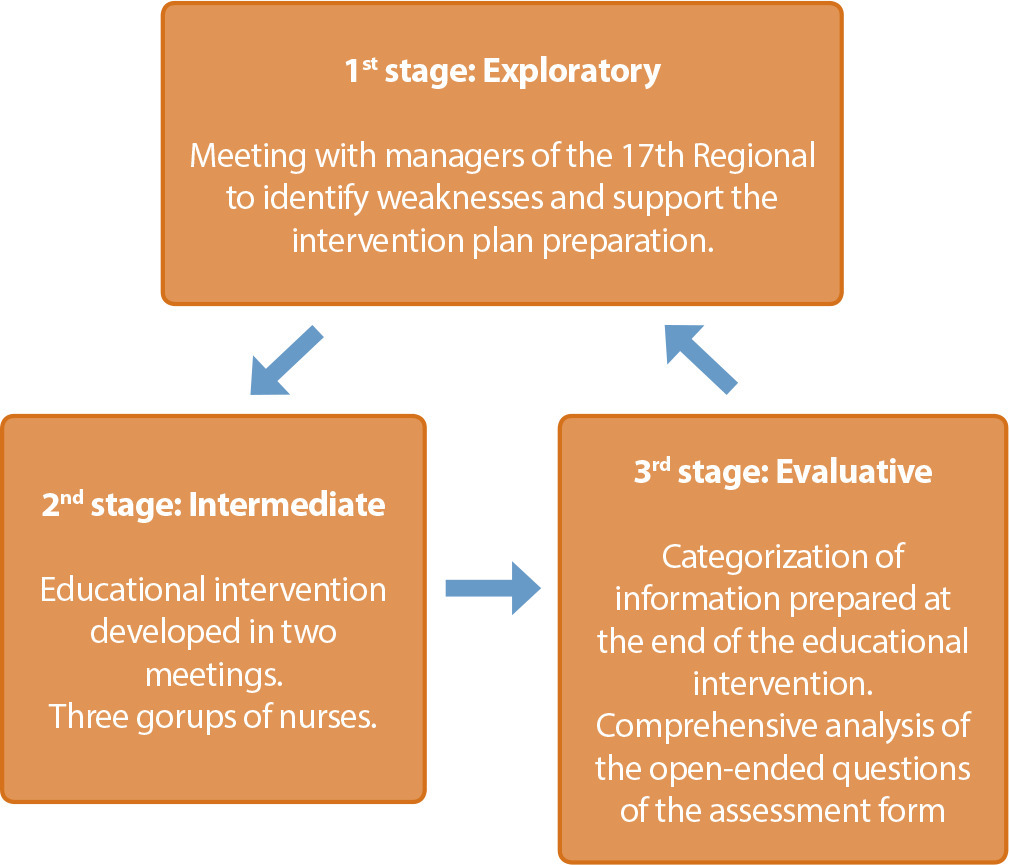
-
ORIGINAL ARTICLE10-09-2023
Spatial and temporal analysis of tuberculosis incidence in Guinea-Bissau, 2018 to 2020
Revista Brasileira de Enfermagem. 2023;76(4):e20220481
Abstract
ORIGINAL ARTICLESpatial and temporal analysis of tuberculosis incidence in Guinea-Bissau, 2018 to 2020
Revista Brasileira de Enfermagem. 2023;76(4):e20220481
DOI 10.1590/0034-7167-2022-0481
Views0See moreABSTRACT
Objective:
to analyze the epidemiological profile, spatial and temporal distribution of tuberculosis in Guinea-Bissau from 2018 to 2020.
Methods:
an ecological study, carried out in Guinea-Bissau, considering new cases of tuberculosis. Spatial analysis of areas was used to verify tuberculosis distribution in the country, and time series were used to identify incidence evolution over the years of study.
Results:
a total of 6,840 new cases of tuberculosis were reported. Tuberculosis incidence rate in the country ranged from 36.8 to 267.7 cases/100,000 inhabitants, with emphasis on the regions of Bissau and Biombo (over 90 cases/100,000). By using time series, it was possible to observe an increase in case incidence over the years of study.
Conclusions:
the study made it possible to identify the epidemiological profile of tuberculosis in Guinea-Bissau, spatial distribution heterogeneity, in addition to identifying the disease evolution over the years of investigation.
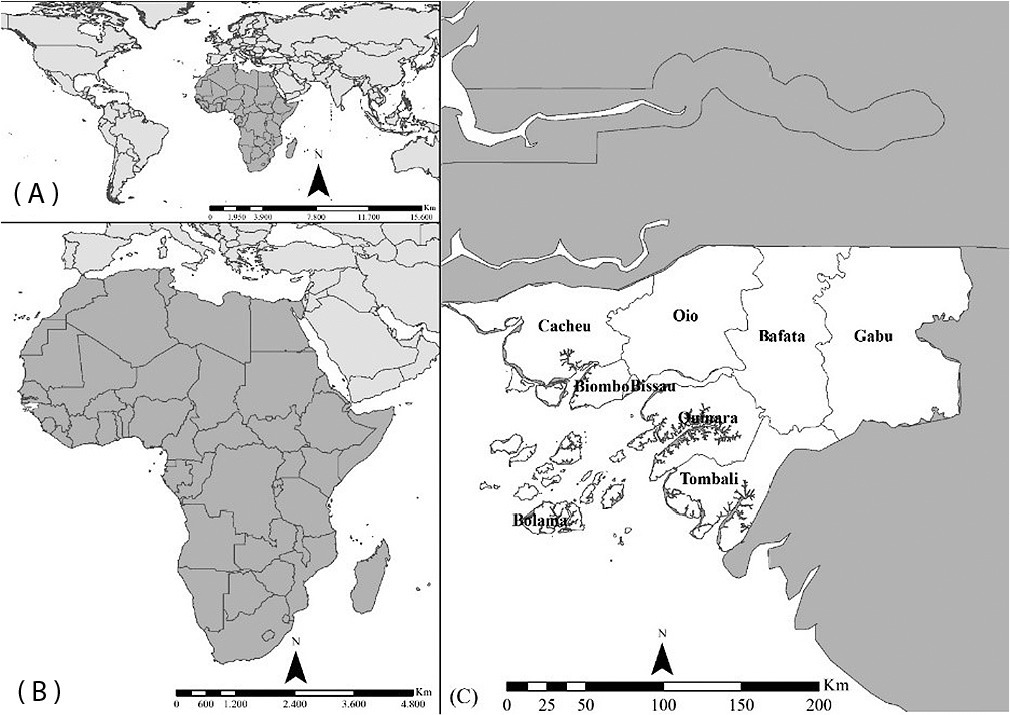
-
ORIGINAL ARTICLE10-09-2023
Eating habits: what foods do children between 12 and 36 months consume?
Revista Brasileira de Enfermagem. 2023;76(4):e20220393
Abstract
ORIGINAL ARTICLEEating habits: what foods do children between 12 and 36 months consume?
Revista Brasileira de Enfermagem. 2023;76(4):e20220393
DOI 10.1590/0034-7167-2022-0393
Views0See moreABSTRACT
Objective:
to identify toddlers’ eating habits.
Method:
a cross-sectional study of quantitative analysis, with a sample of 808 toddlers who attended day care centers in the district of Viseu, Portugal, between November 2018 and September 2019. Data were collected using a questionnaire directed at parents.
Results:
the prevalence of children who ate six meals a day was 42.8%, and 42.5%, those who ate five meals. It was found that 2.0% of children consumed chocolates, 1.0%, desserts, and 0.4%, carbonated beverages, daily. On average, dairy product (M=5.61; SD=2.62) and meat/fish/egg (M=4.80; SD=3.57) consumption was higher than recommended, while fat (M=0.48; SD=0.40), legume (M=0.49; SD=0.45), vegetable (M=1.18; SD=0.87) and water (M=0 .51; SD=0.29) consumption was lower.
Conclusions:
there was a higher or lower consumption than recommended for some foods, highlighting the need to implement nursing intervention programs aimed at promoting healthy eating habits in toddlers and families.
-
REVIEW10-09-2023
Self-care guidelines for patients in the post-hematopoietic stem cell transplantation period: a scoping review
Revista Brasileira de Enfermagem. 2023;76(4):e20220383
Abstract
REVIEWSelf-care guidelines for patients in the post-hematopoietic stem cell transplantation period: a scoping review
Revista Brasileira de Enfermagem. 2023;76(4):e20220383
DOI 10.1590/0034-7167-2022-0383
Views0See moreABSTRACT
Objective:
To map the evidence on self-care guidelines for patients in the post-hematopoietic stem cell transplantation (HSCT) period.
Method:
Scoping review supported by Joanna Briggs Institute recommendations, with searches conducted between March and April 2022 in national and international databases and repositories of theses and dissertations.
Results:
Of the 11 studies that composed the final sample, the guidelines had a social and personal aspect, as post-transplant patients need to follow numerous essential recommendations for the prevention of infections and complications for successful treatment and improved quality of life.
Conclusion:
Knowing the self-care guidelines that must be performed by post-HSCT patients is fundamental for the nursing team to provide the necessary information for care outside the controlled environment of the hospital, in addition to minimizing episodes of infection, death, and increasing the survival and quality of life of transplant recipients.
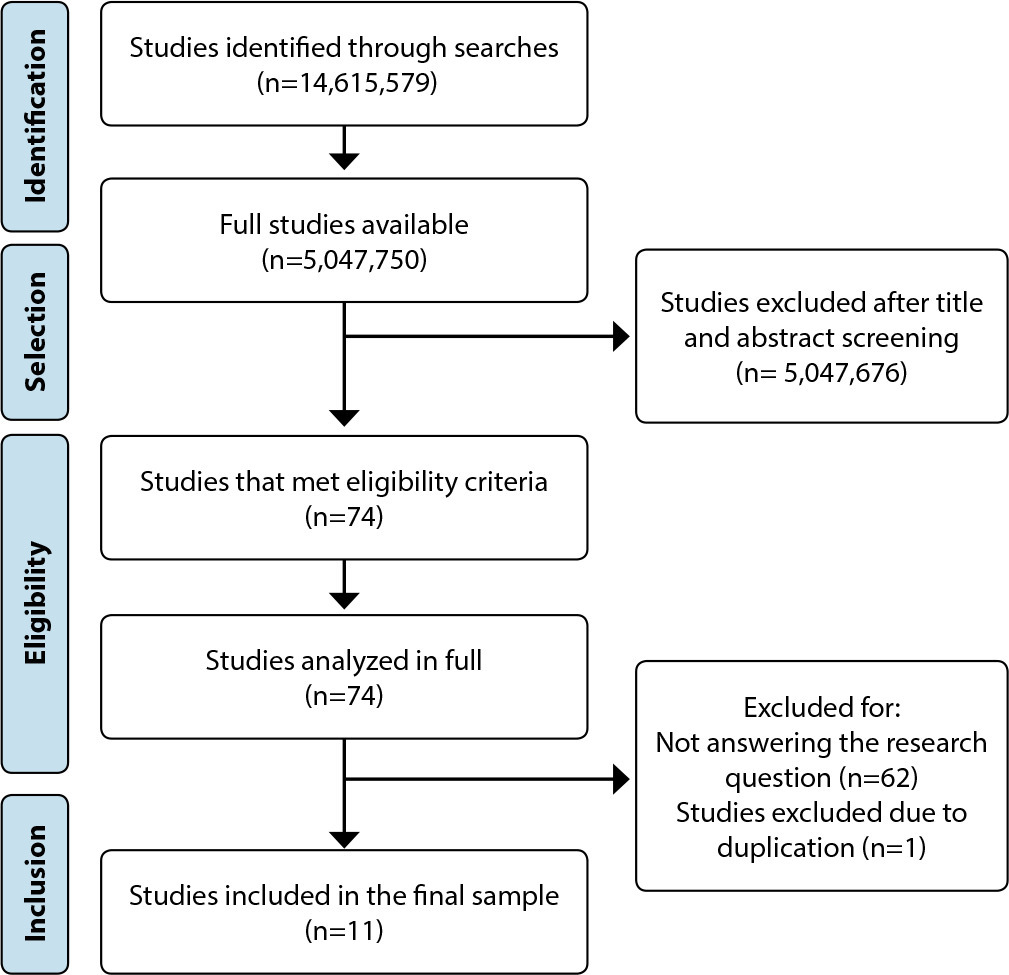
-
ORIGINAL ARTICLE12-16-2024
Health literacy development of Primary Health Care patients: qualitative research
Revista Brasileira de Enfermagem. 2024;77(6):e20240154
Abstract
ORIGINAL ARTICLEHealth literacy development of Primary Health Care patients: qualitative research
Revista Brasileira de Enfermagem. 2024;77(6):e20240154
DOI 10.1590/0034-7167-2024-0154
Views0See moreABSTRACT
Objectives:
to identify the process of health literacy development among primary care patients, relating it to their self-care practices.
Methods:
qualitative, prospective research with 22 patients from two Family Health Strategy units. Data were obtained through individual semi-structured interviews, examined through descriptive statistics and thematic content analysis.
Results:
the results discuss how participants learn about health and how this resonates in their behaviors, culminating in two thematic categories: “Health knowledge construction”; and “Dialogue between health knowledge construction and patient care actions”.
Final Considerations:
health knowledge is developed mainly through interpersonal relationships, mediated by health professionals through bonding and communication. Community educational actions and training of health professionals in communication can promote health literacy and self-care among patients.

-
ORIGINAL ARTICLE12-16-2024
Analysis of omission of antimicrobial doses in Intensive Care Units
Revista Brasileira de Enfermagem. 2024;77(6):e20240102
Abstract
ORIGINAL ARTICLEAnalysis of omission of antimicrobial doses in Intensive Care Units
Revista Brasileira de Enfermagem. 2024;77(6):e20240102
DOI 10.1590/0034-7167-2024-0102
Views0See moreABSTRACT
Objectives:
to analyze the rate of antimicrobial dose omission in intensive care units.
Methods:
cross-sectional study carried out between March 1 and September 30, 2023, in intensive care units of a University Hospital in Rio de Janeiro.
Results:
the sample consisted of 452 prescriptions and 1467 antimicrobial doses. The dose omission rate was 4.29%. Each antimicrobial prescribed increased the chance of omission by 51%. The strategy of double-checking prescriptions helped prevent 30% of antimicrobial dose omissions (p=0.0001).
Conclusions:
monitoring the omission of antimicrobial doses can guide nursing actions to improve quality and patient safety, contributing to the prevention of medication errors, antimicrobial stewardship and the fight against antimicrobial resistance.
-
REVIEW12-16-2024
Recommendations for guidelines for promoting mental health in the workplace: an umbrella review
Revista Brasileira de Enfermagem. 2024;77(6):e20240086
Abstract
REVIEWRecommendations for guidelines for promoting mental health in the workplace: an umbrella review
Revista Brasileira de Enfermagem. 2024;77(6):e20240086
DOI 10.1590/0034-7167-2024-0086
Views1See moreABSTRACT
Objectives:
to summarize the recommendations of guidelines for promoting mental health in the workplace.
Methods:
an umbrella review, according to Joanna Briggs Institute and Preferred Reporting Items for Systematic reviews and Meta-Analyses methodological assumptions. Data collection was carried out in January 2021 and updated in July 2023 in the American Psychological Association, Cochrane Library, EMBASE, National Library of Medicine, and Scopus databases. Systematic reviews that assessed guidelines with recommendations for mental health care for workers were included. PROSPERO registration CRD42023461845.
Results:
four systematic reviews published between 2015 and 2018 were identified. The abstracts highlighted actions that facilitate and inhibit the recommendations as well as three categories of intervention: primary prevention – worker protection; secondary prevention – promoting workers’ mental health; and tertiary prevention – supporting, monitoring and rehabilitating workers upon returning to work.
Conclusions:
the interventions are based on prevention, promotion and early recognition, support and rehabilitation of mental health problems.

-
ORIGINAL ARTICLE12-16-2024
Psychometric analysis of ProQOL-BR in nursing: building hospital safety and protection
Revista Brasileira de Enfermagem. 2024;77(6):e20240085
Abstract
ORIGINAL ARTICLEPsychometric analysis of ProQOL-BR in nursing: building hospital safety and protection
Revista Brasileira de Enfermagem. 2024;77(6):e20240085
DOI 10.1590/0034-7167-2024-0085
Views0See moreABSTRACT
Objectives:
to analyze the psychometric properties of the ProQOL-BR instrument in hospital nursing professionals.
Methods:
a methodological study to validate the ProQOL-BR. Confirmatory factor analysis, assessment of local and global adjustment quality, Pearson hypothesis testing and Cronbach’s alpha internal consistency analysis were used.
Results:
a total of 490 professionals participated. The model presents adequate quality due to factor weights (λ≥ 0.40), acceptable overall fit quality and adequate chi-square ratio and degrees of freedom (χ2/g.1=2.51) for the parameters of CFI (0.923), GFI (0.902), TLI (0.914) and RMSEA (0.042). In terms of validity, it was shown to be adequate with CC=0.89. The internal consistency obtained by standardized Cronbach’s alpha was 0.761. Criterion validity was shown to be favorable with significant correlations (0.001).
Conclusions:
the instrument was validated regarding content, criteria and reliability. Three questions were removed from the original instrument, ProQOL-BR, leaving the final instrument with 25 questions.

-
12-16-2024
GerenciaDOR™: development of digital technology by nurses for the assessment of patients with chronic pain
Revista Brasileira de Enfermagem. 2024;77(6):e20240050
Abstract
GerenciaDOR™: development of digital technology by nurses for the assessment of patients with chronic pain
Revista Brasileira de Enfermagem. 2024;77(6):e20240050
DOI 10.1590/0034-7167-2024-0050
Views0See moreABSTRACT
Objectives:
to develop a digital technological solution (prototype) for assessing patients with chronic pain.
Methods:
this is a methodological and technological development study based on the Human-Centered Design framework and the principles of Patient-Centered Care. The prototype guides patients through a body diagram and directs them to an evaluation using specific instruments that address the multidimensional aspects of chronic pain.
Results:
the GerenciaDOR* project enables navigation through the Web App screens, providing access to pain assessment features up to the presentation of results.
Final Considerations:
the study describes a systematic approach to pain assessment and expands nurses’ knowledge in pain management. Additionally, it can promote the development of other digital technologies for chronic pain assessment and contribute to a multidisciplinary, patient centered treatment.

-
ORIGINAL ARTICLE12-16-2024
Respectful care for postpartum women with sickle cell disease: a netnographic study
Revista Brasileira de Enfermagem. 2024;77(6):e20230545
Abstract
ORIGINAL ARTICLERespectful care for postpartum women with sickle cell disease: a netnographic study
Revista Brasileira de Enfermagem. 2024;77(6):e20230545
DOI 10.1590/0034-7167-2023-0545
Views0See moreABSTRACT
Objectives:
to analyze principles of respectful maternity care in narratives of postpartum women with sickle cell disease, relating them to Sustainable Development Goals.
Methods:
netnographic study, with two videos published in 2020. Deductive iconographic and thematic analysis by Respectful Maternity Care Charter, organized in MAXQDA.
Results:
principles identified were the right to: freedom from harm and ill-treatment; information, informed consent, refusal of medical procedures, and respect for their choices and preferences including companion; be considered a person from birth, with dignified and respectful treatment; health at the highest possible level; newborns being with their parents or guardians. The Sustainable Development Goals for women by 2030 were not positively contemplated in postpartum women’s experience.
Final Considerations:
it is appropriate that health workers qualify themselves to provide respectful maternity care, with qualified listening, understanding, and resolution of unique demands of postpartum women with sickle cell disease, seeking equality in care for women.

-
ORIGINAL ARTICLE12-16-2024
Construction and validation of an educational game on biosafety in the central sterile supply department
Revista Brasileira de Enfermagem. 2024;77(6):e20230478
Abstract
ORIGINAL ARTICLEConstruction and validation of an educational game on biosafety in the central sterile supply department
Revista Brasileira de Enfermagem. 2024;77(6):e20230478
DOI 10.1590/0034-7167-2023-0478
Views0See moreABSTRACT
Objectives:
to construct and validate an educational game on biosafety in the Central Sterile Supply Department of a hospital in Curitiba, PR.
Methods:
the study was conducted using a quantitative approach, employing applied and technological research with an exploratory design. The process was divided into six stages, from the definition of the theme to the validation and application of the game. The study was carried out from May to August 2022, involving 17 nursing professionals from a Central Sterile Supply Department during day and night shifts, as well as 9 judges.
Results:
the study resulted in the construction of a board game named by the authors as “My Health First.”
Conclusions:
the research achieved its objective of constructing and validating an educational game. By reflecting on professional practice and correlating the occupational risks present, the professionals were able to list safe actions, identify problems, and seek solutions.

-
ORIGINAL ARTICLE12-16-2024
Training profile of intensive care nurses in Brazil: cross-sectional study
Revista Brasileira de Enfermagem. 2024;77(6):e20230460
Abstract
ORIGINAL ARTICLETraining profile of intensive care nurses in Brazil: cross-sectional study
Revista Brasileira de Enfermagem. 2024;77(6):e20230460
DOI 10.1590/0034-7167-2023-0460
Views0See moreABSTRACT
Objectives:
to describe the training profile of Brazilian intensive care nurses.
Methods:
a cross-sectional study carried out in two stages: a structured, self-administered questionnaire; mapping of the national supply of lato sensu postgraduate courses. Data was collected on the sociodemographic profile, training process and characterization of the courses.
Results:
in the first stage, 202 respondents were obtained. The majority were women (79.2%), aged between 26 and 45 (80.7%), graduated less than 5 years ago (44%), through lato sensu postgraduate courses (55.5%), which were marked by the absence of laboratory practice (57.5%) and guided tours (42.5%). In the second stage, 457 courses were identified, with face-to-face teaching (58.9%), a workload of 360 to 420 hours (51.2%), a duration of up to 6 months (41.8%) and variation in the sub-area of training.
Conclusions:
there was a predominance of professionals graduating from lato sensu post-graduate courses, with essentially theoretical teaching and heterogeneity in terms of modality, workload and sub-area of training.
-
01-01-2016
Peritoneal dialysis: family care for chronic kidney disease patients in home-based treatment
Revista Brasileira de Enfermagem. 2016;69(6):1172-1178
Abstract
Peritoneal dialysis: family care for chronic kidney disease patients in home-based treatment
Revista Brasileira de Enfermagem. 2016;69(6):1172-1178
DOI 10.1590/0034-7167-2016-0262
Views0See moreABSTRACT
Objective:
to propose a family care model for patients with chronic kidney disease in peritoneal dialysis based on evidence indicated by family members.
Method:
this was a qualitative descriptive study that used the Convergent Care Research method. It was conducted at a state hospital in Rio de Janeiro, including techniques for recording individual interviews and consisted of a group of 19 study participants. Data were analyzed according to the stages proposed by the method, generating a category that used a cultural question as the basis for patient care resulting in a proposal for home-based family care.
Results:
the patient care model proposed includes dialogue and reflection in sharing the knowledge of “professional” and “popular” systems, aiming to improve the patient’s quality of life.
Conclusion:
family members were able to promote care based on cultural preservation, accommodation and repatterning, as proposed by Leininger’s Sunrise Model.
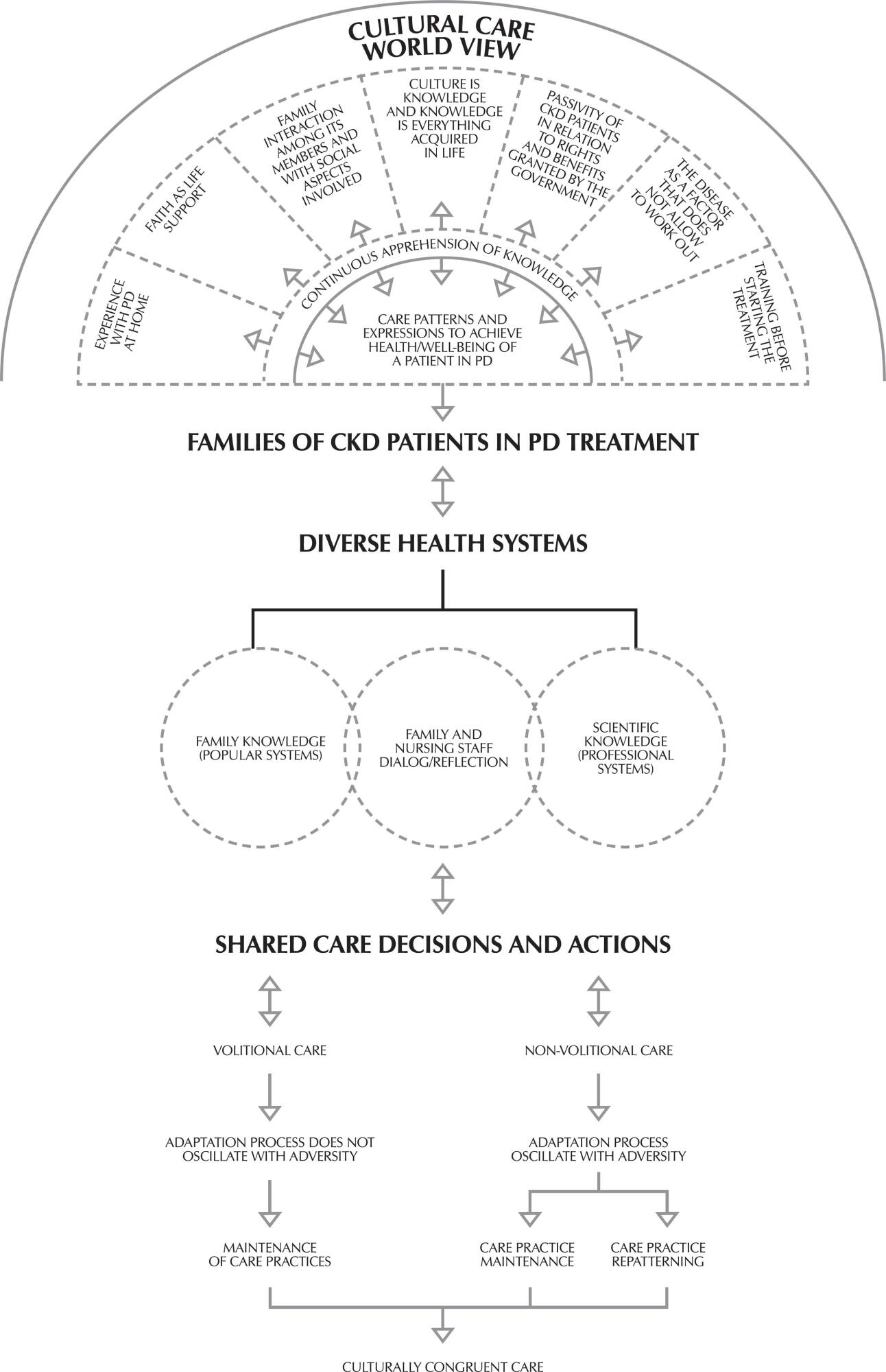
-
01-01-2016
Technology for self-care for ostomized women’s sexual and reproductive health
Revista Brasileira de Enfermagem. 2016;69(6):1164-1171
Abstract
Technology for self-care for ostomized women’s sexual and reproductive health
Revista Brasileira de Enfermagem. 2016;69(6):1164-1171
DOI 10.1590/0034-7167-2016-0302
Views0See moreABSTRACT
Objective:
to validate the technology of printed booklets on self-care for ostomized women’s sexual and reproductive health.
Method:
a methodological study was performed with a focus on the construction and validity of a printed booklet. The content of this booklet was validated by 11 specialist judges/nurses, according to a Content Validity Index (CVI) equal to or higher than 0.80. Appearance was validated by nine ostomized women, according to an assessment of the difficulty and convenience of the educational material.
Results:
the booklet was validated by specialists, with an overall mean CVI equal to 0.87. Moreover, the target population showed 100% of agreement in terms of the adequacy of organization, writing style, appearance and motivation of this booklet.
Conclusion:
the educational technology in question was validated according to content and appearance, thus representing an adequate, reliable and easily understandable resource to acquire knowledge about self-care for ostomized women’s sexual and reproductive health.

-
01-01-2016
Short-course therapy for tuberculosis: a discourse analysis
Revista Brasileira de Enfermagem. 2016;69(6):1154-1163
Abstract
Short-course therapy for tuberculosis: a discourse analysis
Revista Brasileira de Enfermagem. 2016;69(6):1154-1163
DOI 10.1590/0034-7167-2016-0330
Views0See moreABSTRACT
Objective:
to analyze the meanings produced by nursing professionals in the directly observed treatment (DOT) for tuberculosis (TB) in the city of São Paulo.
Method:
this is a qualitative study, conducted in March and April 2014 through semi-directed interviews with nine nurses. The empirical material produced was analyzed according to the theoretical and methodological support of the Discourse Analysis of French matrix.
Results:
results have emerged as three discursive blocks: conditions for the production of tuberculosis control practices; production conditions facilitating the treatment of tuberculosis; and production conditions hindering the treatment of tuberculosis.
Conclusion:
these professionals’ words produce different meanings, which suggest that the practices of nursing professionals allow the patient to search for a cure, which is reinforced by incentives of a social nature, but permeated by the vicissitudes that are circumscribed in the ill person’s everyday production conditions.
-
00-00-0000
Representações cotidianas de jovens sobre a periferia
. ;
Abstract
Representações cotidianas de jovens sobre a periferia
. ;
Views0RESUMOObjetivos:compreender as representações cotidianas de jovens sobre a periferia, com a finalidade de compor os temas para programas midiáticos de educação sobre drogas.Método:abordagem marxista, com pesquisa-ação emancipatória e participação em oficinas de 13 jovens de uma escola pública da periferia de São Paulo.Resultados:entre os jovens há representações cotidianas contraditórias sobre o papel do Estado, que, […]See more -
01-01-2016
Aids in the elderly: reasons that lead to late diagnosis
Revista Brasileira de Enfermagem. 2016;69(6):1140-1146
Abstract
Aids in the elderly: reasons that lead to late diagnosis
Revista Brasileira de Enfermagem. 2016;69(6):1140-1146
DOI 10.1590/0034-7167-2016-0370
Views0See moreABSTRACT
Objective:
to investigate elderly living with HIV/Aids and health professionals, what are the reasons that lead to late diagnosis of HIV infection in the elderly.
Method:
prospective, qualitative study, conducted at a specialized outpatient clinic with elderly living with HIV/Aids, diagnosed age over 60 years and in the Family Health Strategy units with nurses and physicians. Data were collected through interviews and verified by content analysis, using the theoretical framework of vulnerability.
Results:
a total of 11 elderly, 11 nurses and 12 physicians participated in the study. Three empirical categories emerged: the late diagnosis of HIV happens against the health service; invisibility of the sexuality of the elderly; and weaknesses in the anti-HIV serology request for the elderly.
Conclusion:
there are health professionals who see the elderly as asexual, causing the diagnosis of HIV to happen in the secondary and tertiary service instead of primary care.
-
01-01-2016
Storytelling: a care technology in continuing education for active ageing
Revista Brasileira de Enfermagem. 2016;69(6):1132-1139
Abstract
Storytelling: a care technology in continuing education for active ageing
Revista Brasileira de Enfermagem. 2016;69(6):1132-1139
DOI 10.1590/0034-7167-2016-0390
Views0See moreABSTRACT
Objective:
assessing relevance and effectiveness of care/educational technology in the form of “storytelling” as a strategy in the cultivation of active ageing (AA) for elderly users of a Basic Health Unit (BHU), from the Amazon region.
Method:
convergent care research (CCR) held in a BHU in Belém, state of Pará, with eight elderly ladies for testing this technology. An active ageing assessment questionnaire and WHOQOL-BREF – quality of life assessment were applied. After training with a view to continuing education, elderly ladies told stories for an audience that addressed the question: “What did you learn from it for your life?”
Results:
tThe popular stories elicited reactions from which the following categories emerged: solidarity; respect for the other; imagination, dreams, hopes and culture of the Amazonian. This practice had a positive result, producing changes in the quality of life of the elderly, particularly in the psychological domain.
Conclusion:
“storytelling” proved to be an innovative technology, a relevant and effective resource in health education, especially for active ageing.

-
01-01-2016
Nurse care practices in the Family Health Strategy
Revista Brasileira de Enfermagem. 2016;69(6):1124-1131
Abstract
Nurse care practices in the Family Health Strategy
Revista Brasileira de Enfermagem. 2016;69(6):1124-1131
DOI 10.1590/0034-7167-2016-0273
Views1See moreABSTRACT
Objective:
to analyze the practices of care of nurses working in teams of the family health strategy, from the perspective of users.
Method:
qualitative research conducted with 34 registered users in seven family health units of a municipality of Bahia from June to December 2014. The results were organized by the technique of content analysis.
Results:
users showed satisfaction with the nurse care due to listening, warmth and resolution of their health needs, despite the emphasis on procedures and programs targeted to populational groups. The dissatisfaction stems from the authoritarian, prescriptive and inflexible attitude in the nurse care. It was also emphasized that the home visits are directed to the bedridden and more restricted to preventive actions. Educational activities occur during the nursing consultation and in the health unit.
Conclusion:
there is urgent need of redefining the care as a structuring axis of the nurse practice.
-
01-01-2016
Interdisciplinary care praxis in groups of people living with fibromyalgia
Revista Brasileira de Enfermagem. 2016;69(6):1115-1123
Abstract
Interdisciplinary care praxis in groups of people living with fibromyalgia
Revista Brasileira de Enfermagem. 2016;69(6):1115-1123
DOI 10.1590/0034-7167-2016-0279
Views0See moreABSTRACT
Objectives:
to analyze the integrated community therapy model for the empowerment of people living with fibromyalgia and discuss the impact of this interdisciplinary intervention in the health-disease process and self-care.
Method:
a participatory-approach qualitative study, developed in 2015 with 11 participants at the Laboratory of Physiology Applied to Physical Education of the Rio de Janeiro State University, RJ. Data production comprised World Café, participant observation and semi-structured interview. The analysis was performed according to Bardin, through data triangulation in dialogue with the relevant literature.
Results:
the integrated community therapy group is a driving force in building and expanding knowledge about fibromyalgia and in self-care empowerment.
Conclusion:
this group strategy proved to be an interdisciplinary praxis tool that enables the development of solidary care networks. Thus, shared knowledge was generated, transformed into a listening and reflection environment to manage personal and family obstacles.
Search
Search in:
Nuvem de Tags
Adolescente (85) Atenção Primária à Saúde (239) COVID-19 (91) Criança (91) Cuidados de Enfermagem (269) Educação em Enfermagem (151) Educação em Saúde (139) Enfermagem (930) Enfermagem Pediátrica (86) Estudantes de Enfermagem (77) Estudos de Validação (131) Família (87) Idoso (208) Promoção da Saúde (99) Qualidade de Vida (104) Saúde do Trabalhador (86) Saúde Mental (145) Saúde Pública (82) Segurança do Paciente (150) Tecnologia Educacional (100)



